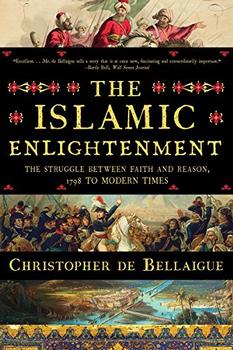Summary | Excerpt | Reviews | Beyond the Book | Readalikes | Genres & Themes | Author Bio

The Struggle Between Faith and Reason, 1798 to Modern Times
by Christopher de BellaigueIntroduction
At Lowood School for girls, in the reign of King George III of England, an ill-used, orphaned teacher called Jane Eyre lies abed thinking about her future.
'I have served here eight years; now all I want is to serve elsewhere. Can I not get so much of my own will? Is not the thing feasible? Yes – yes – the end is not so difficult; if only I had brain active enough to ferret out the means of attaining it.'
I sat up in bed by way of arousing this sad brain: it was a chilly night; I covered my shoulders with a shawl, and then I proceeded to think again with all my might.
'What do I want? A new place, in a new house, amongst new faces, under new circumstances . . . How do people do to get a new place? They apply to friends, I suppose: I have no friends. There are many others who have no friends, who must look for themselves and be their own helpers; and what is their resource?'
I could not tell: nothing answered me; I then ordered my brain to find a response, and quickly . . . as I lay down it came quietly and naturally to my mind:– 'Those who want situations advertise; you must advertise in the —shire Herald.'
'How? I know nothing about advertising.' Replies rose smooth and prompt now:–
'You must inclose the advertisement and the money to pay for it under a cover directed to the Editor of the Herald; you must put it, the first opportunity you have, into the post at Lowton; answers must be addressed to J. E. at the post-office there: you can go and inquire in about a week after you send the letter, if any are come, and act accordingly.'
This sleepless hour is the corner that Jane Eyre turns in order to fall into the arms of Mr Rochester, for her decision to place an advertisement in the county newspaper will lead to her moving many miles from Lowood and taking up a new position, as governess of Mr Rochester's ward at Thornfield Hall. The passage here determines the path that a much loved novel will follow, and yet it is possible to think of it in a bigger, socially more significant way: as an avenue into a new world.
Jane's urges need no introduction: variety and movement are what she seeks, and the education she has received is her means of achieving it, for the instruction she has received at one of a burgeoning number of English girls' schools has not only lent purpose to an excellent mind, but also raised her above any sense of inadequacy. Jane is independent of spirit and this will allow her to be independent of means. Jane Eyre is modern.
Her modernity extends to the rational way she sees the world and her place in it. Jane is a Christian but in her hour of indecision she does not finger a wooden cross or leverage the Gospels – far less seek signs in the stars. Faith guides and gives her strength in the moral and emotional crises of her life; however, in times of functional dilemma – when she is in search of the 'clear practical form' that will set her fluttering brain to rest – Jane interrogates not God but Jane.
And yet, for Jane to see her scheme to its conclusion, she needs the help of certain features of modern England. Without the provincial newspaper, the post office and finally, when it comes to making the journey to Thornfield Hall, a wheeled conveyance trundling along one of the turnpike roads, safe enough for a woman to take on her own, she will be able to do nothing.
Perhaps more important than any of these things, Jane will need society to agree that she is sovereign over her own destiny – an unmarried woman free to climb aboard a post-chaise and go wherever she pleases, at no risk to her reputation.
Now I want to take up this picture of Georgian England and put it into a quite different setting. Imagine that the Jane Eyre of Charlotte Brontë's novel has been transposed to a non-European situation. By the standards of nineteenth-century globalisation this new environment is not very distant – to get there merely involves crossing the Mediterranean. There one meets the close sibling of the Judaeo-Christian world inhabited by Jane, a civilisation built on the third and most recent of the Hebraic monotheisms and influenced by Greek patterns of thought.
Excerpted from The Islamic Enlightenment by Christopher de Bellaigue. Copyright © 2017 by Christopher de Bellaigue. With permission of the publisher, Liveright Publishing Corporation. All rights reserved.
He has only half learned the art of reading who has not added to it the more refined art of skipping and skimming
Click Here to find out who said this, as well as discovering other famous literary quotes!
Your guide toexceptional books
BookBrowse seeks out and recommends the best in contemporary fiction and nonfiction—books that not only engage and entertain but also deepen our understanding of ourselves and the world around us.